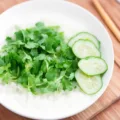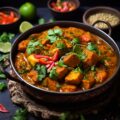Discovering the Vibrant Flavors of Ghana with Zoe Adjonyoh
In the world of culinary arts, few chefs have made as significant an impact in bringing West African cuisine to the global stage as Zoe Adjonyoh. Her passion for Ghanaian food has not only revolutionized the way we think about African cuisine but has also sparked a movement of cultural appreciation and understanding through the universal language of food.
Zoe Adjonyoh, a British-Ghanaian chef, writer, and food activist, has become a beacon of inspiration for food lovers and aspiring chefs alike. Her journey into the heart of Ghanaian cuisine is not just about flavors and recipes; it’s a story of heritage, identity, and the power of food to bring people together.
The Roots of Zoe Adjonyoh’s Culinary Journey
Born to a Ghanaian father and Irish mother, Zoe’s exploration of her Ghanaian roots through food began as a personal quest. What started as a pop-up restaurant in London quickly evolved into a culinary movement, challenging preconceptions about African cuisine and introducing the rich, diverse flavors of Ghana to a wider audience.
Zoe’s approach to Ghanaian cuisine is both traditional and innovative. She respects the authenticity of classic dishes while infusing them with contemporary twists, making them accessible to a global palate. This unique blend of old and new has earned her acclaim in the culinary world and has helped to put Ghanaian food on the map.
Celebrating Ghanaian Flavors and Ingredients
At the heart of Zoe’s cuisine are the vibrant flavors and ingredients that define Ghanaian cooking. From the nutty depth of groundnut soup to the fiery kick of shito (a hot pepper sauce), each dish tells a story of Ghana’s rich culinary heritage.
- Jollof Rice: A beloved West African dish, Zoe’s version combines fragrant rice with a spicy tomato sauce, creating a comforting yet exciting meal.
- Red Red: A hearty bean stew served with fried plantains, showcasing the perfect balance of savory and sweet.
- Kenkey: A traditional fermented corn dough, often served with fish and hot pepper sauce, representing the staple foods of coastal Ghana.
These dishes not only tantalize the taste buds but also serve as a gateway to understanding Ghanaian culture and history.
Beyond the Kitchen: Zoe’s Impact on Food Culture
Zoe Adjonyoh’s influence extends far beyond her delicious recipes. She has become a powerful voice for diversity and inclusion in the food industry, advocating for greater representation of African cuisines and chefs in mainstream culinary circles.
Through her cookbook, “Zoe’s Ghana Kitchen,” and her various food projects, Zoe has made Ghanaian cuisine more accessible to home cooks around the world. She encourages people to explore new flavors and techniques, fostering a greater appreciation for the diversity of African cooking.
Empowering Communities Through Food
One of the most inspiring aspects of Zoe’s work is her commitment to using food as a tool for social change. She has initiated various projects aimed at empowering marginalized communities, particularly in Ghana and other parts of Africa.
By promoting sustainable farming practices, supporting local producers, and educating people about the nutritional benefits of traditional African ingredients, Zoe is helping to create a more equitable and sustainable food system. Her efforts demonstrate how culinary expertise can be a powerful force for positive change in the world.
Embracing Ghanaian Cuisine in Your Own Kitchen
Inspired by Zoe’s passion for Ghanaian food? Here are some tips to start your own culinary adventure:
- Experiment with key Ghanaian ingredients like plantains, yams, and cassava.
- Try making your own shito sauce to add a spicy kick to your dishes.
- Explore the world of Ghanaian spices, including grains of paradise and calabash nutmeg.
- Don’t be afraid to blend traditional recipes with your own culinary traditions.
- Share your Ghanaian-inspired creations with friends and family, spreading the joy of this vibrant cuisine.
Remember, cooking is about more than just following recipes; it’s about exploring cultures, creating connections, and nourishing both body and soul.
FAQs About Zoe Adjonyoh and Ghanaian Cuisine
1. Who is Zoe Adjonyoh?
Zoe Adjonyoh is a British-Ghanaian chef, writer, and food activist known for popularizing Ghanaian cuisine in the UK and beyond. She is the author of “Zoe’s Ghana Kitchen” and has been instrumental in bringing West African flavors to a global audience.
2. What are some key ingredients in Ghanaian cooking?
Essential ingredients in Ghanaian cuisine include plantains, yams, cassava, palm oil, groundnuts (peanuts), and various spices like grains of paradise. Staple dishes often feature rice, beans, and a variety of proteins such as fish and chicken.
3. How has Zoe Adjonyoh influenced the perception of African cuisine?
Zoe has challenged stereotypes about African food by presenting Ghanaian cuisine as sophisticated, diverse, and accessible. Her work has helped to elevate African cuisine in the global culinary scene and has inspired a new generation of chefs to explore their African heritage.
4. What is Jollof Rice, and why is it significant?
Jollof Rice is a popular West African dish made with rice cooked in a spicy tomato sauce. It’s significant not only for its delicious flavor but also as a point of friendly rivalry between West African countries, each claiming to make the best version.
5. How can I learn more about cooking Ghanaian food?
To learn more about Ghanaian cooking, you can start by exploring Zoe Adjonyoh’s cookbook “Zoe’s Ghana Kitchen.” Additionally, there are many online resources, cooking classes, and YouTube tutorials dedicated to Ghanaian cuisine. Don’t be afraid to experiment and adapt recipes to your taste and available ingredients.









